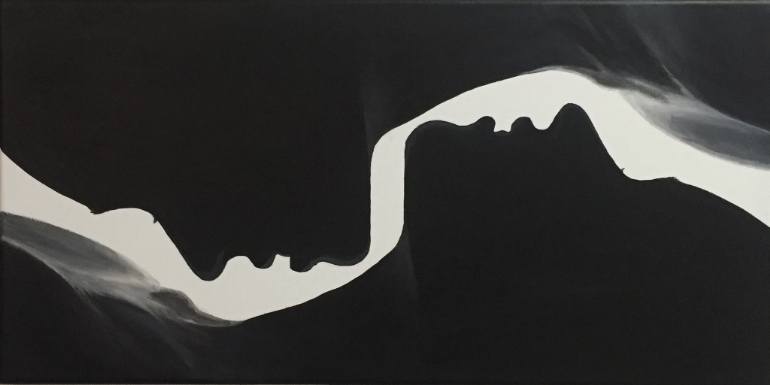by: Drew Sheldon ((Header art, entitled “Sexual Abuse, acrylic” is by the incredibly talented Marianne Charlotte Mylonas-svikovsky.))
Because silence won’t help end the cycle of abuse, and because nobody is immune from victimhood…

It is difficult for society to accept that men can also be victims of abuse. Statistics for survivors of abuse occurring in adulthood are difficult to find, and for childhood incidents, they vary widely. In terms of sexual abuse, prevalence rates for males are often cited as anywhere from one in six to one in every twenty males being sexually abused in childhood. Some studies have also found that males are less likely to label to label their experiences as abuse as defined by common standards.
I never realized my relationship with my now ex-girlfriend was abusive until a friend pointed it out to me. I simply thought of her as being excessively jealous. I didn’t recognize that her behavior was isolating and gaslighting. No one who knows her would ever think of her as an abuser. No one, including me, would say her behavior was malicious, but the results of her actions were still quite damaging.
My ex-girlfriend was one of the first people I had ever told about the sexual abuse I suffered in childhood. She admitted that it was initially hard to believe that a girl had forced sex upon me, but she came to understand that saying no was not an option at my young age. The effects became clearer to her as our relationship progressed, and my shyness with sexual intimacy became more apparent.
That shyness was a part of what initially attracted her to me. I could be affectionate, but my touch was very gentle. “It’s as if you’re afraid to touch me,” she once wrote to me, later realizing that was actually true. I told her about my deep dark fear of becoming the type of monster who had hurt me. The anxiety was sometimes so intense that it made me suicidal. I’d rather die than hurt someone the way I had been hurt.
Another thing that she loved was my easy rapport with women. Having spent most of my childhood as the only male in my house, that came quite naturally to me. Many of my friends were women, and even some of my closest male friends were quite feminine. My ex-girlfriend had been one of those friends for a couple of years. She enjoyed my supportiveness and caring nature. Later on, it would become a point of jealousy for her.
My ex-girlfriend would never complain about my female friends directly or accuse me of cheating. She would, however, encourage me to break up with her on a regular basis. “Why are you with me?” she’d ask. “I want you to be happy. You should be with someone else.” Sometimes she would mention the name of a female friend as an example of someone who was better than her. Often these friends were significantly younger. When I would mention that the pretty girl who obviously made her uncomfortable was younger than my niece, she would deny being jealous, but her mood would clearly darken.
As time went on my ex-girlfriend would grow visibly uncomfortable whenever I talked with female friends. When I went back to school, she expressed concern with my being around so many pretty young women (even though I was in my late 30s). She even mentioned a couple of friends of mine as being cooler and more attractive than her. They were half my age and are now married to each other. Whenever I could, I would offer her comfort by holding her hand or putting my arm around her while talking to one of these friends. She would often thank me for the reassurance but would deny being jealous if I mentioned that she was acting so. She would try to convince me that my perceptions were wrong. Intentional or not, she was gaslighting me.
My ex-girlfriend constantly questioned my commitment to our relationship. She frequently hinted at suicide. She never said so explicitly, but it was easy to guess that it would be more likely outcome if I left her. She would ask, and even suggest, I begin a relationship with various other women. I was constantly promising my devotion and telling her she was the only one for me. Despite that, her anxious mistrust would arise again whenever I even spoke of a female friend. I couldn’t confront the real issue of her insecurity and jealousy. So I began to convince myself that isolation was my best course of action.
The worst case of her jealousy came when I was working in a shelter for homeless youth. We had taken in a fourteen year old girl who had been severely abused emotionally, physically, and sexually. The girl reminded me a lot of myself as a child, very shy and even bearing a strong physical resemblance to myself. I imagine our baby pictures could’ve been swapped for one another. She looked like she could be my daughter. Knowing that she had been hurt like I had been gave me a strong compulsion to protect and care for her.
When she arrived, she had not eaten or slept in over thirty-six hours. She hadn’t bathed in days. During my first shift with her, I built enough trust that she ate a little food, took a shower, and slept for a several hours. Every day I would remind her that she was in a safe place, and gradually she made more and more progress. On her fifth night in the shelter, she asked me for a hug. I broke the rules and gave her one, perhaps the first time in her life she received genuine affection from an adult male.
Over lunch the next day I told my ex-girlfriend about it. I had told her previously how this little girl had spent years being treated as a sex toy. Despite the violation of rules, I was proud of what I’d accomplished with her. My ex-girlfriend’s jealousy was immediately obvious, and she was unable to deny it. “She is a child,” I said with shock and anger in my voice.
“It’s not your boundaries I’m worried about,” she answered. “It’s hers.”
I’ve never found a plausible explanation for how this girl’s boundaries made my ex-girlfriend nervous that I might cheat on her. I never worked at the shelter alone. This was a fourteen year old girl less than half my weight. She had no chance of overpowering me. Drugging me would be difficult. Either of these plans would require a great deal of cooperation and/or incapacitation of my co-workers and other clients in the shelter. She had better odds of winning the lottery, and and she would still be required to commit rape. My ex-girlfriend was a sexual assault survivor herself. Surely, she wouldn’t consider it cheating if I were raped.
The only explanation I can come up with is that my ex-girlfriend thought my deepest darkest fear was in danger of coming true. The only way I could willingly have sex with this child would be to rape her. My ex knew me better than anyone else in the world. She knew it would take an enormous leap for me to overcome my shyness to cheat on her with anyone, but somehow she seemed to think a sexual assault would make that easier. She knew I’d rather die than hurt a child like that. She knew all that, and yet she still she implied that I was a monster.
I think I was six years old when “it” happened. My sister was four years older and had recently “lost her virginity” to a grown man. I didn’t really understand what was going on, and I was very much afraid of her temper if I were to say no. I learned about sex that day. It made me feel disgusted by it, and puberty was much more difficult as I hated myself for the natural sexual feelings I was beginning to have. When I would occasionally catch the eye of a girl my age, I would look away or find a way to make her do so.
As I grew older and began to understand what had happened to me, I vowed never to continue the cycle. I was very careful around younger girls, always examining my feelings and sometimes even avoiding them as much as I could. Eventually, I came to accept that I am not someone who would hurt a child the way I had been hurt. Meeting a child who resembled me in so many ways made me want to protect her from any such monsters. To have someone so close to me imply that I might be that danger was devastating.
I no longer knew why I was with my ex-girlfriend, but I was also trapped by the repeated promises I had made in order to ease her anxiety. It took me fourteen more months to break up with her and another year beyond that to accept that our relationship had been abusive. I’m still working to accept it. I am a man. People are afraid to accept that I could be abused by a woman. I’m afraid to accept that too.
It is hard to accept men as victims of abuse, but we are much more often than people tend to realize. The reported statistics vary widely, and so many of them depend on men reporting being abused, which we are often reluctant to do. We have to accept it, though. Keeping us in silence does nothing to stop the cycle, and more often than not it allows it to continue.






What a beautiful post. I hope you are doing well. You are brave.
This is just beautiful and heartbreaking Drew. I’m so sorry for the women who have treated you so very very poorly. It gladdens my heart to know that you have turned your poor treatment into volunteering to help others.